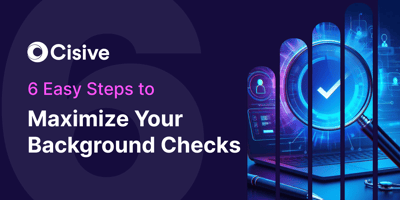

Today’s typical background screening process occupies considerable time and administrative...

Most organizations only conduct background checks during the hiring process. They understand that pre-employment background checks minimize the risk to their business, employees and customers. Companies also assume that a person’s history determines their current and future actions and minimizes risk to their workforce. However, more companies are running background checks or continuous screening on current employees to avoid any potential safety issues and claims of negligence or violence in the workplace.
There are currently no federal or state laws mandating continuous screening or setting limits on how long background checks are valid. The short answer to how long a background check is valid: The background check is a snapshot in time and is only as valid as the information required for an employee to perform daily duties safely and without incident.
In this post, we’ll go over a list of common and frequently questions about background check validity and recommendations for continuous screening.
Most experts in workplace safety and liability recommend that companies include a mandate for re-screening every two to five years into their background screening policies. This procedure should extend across all departments and seniority levels to ensure that the workplace is as safe as possible.
Re-screening is also called continuous screening, or the process of monitoring employee records in real-time to flag internal threats and safety concerns. Continuous background screening is a post-hire screening that is performed in real-time for the entire workforce.
This is also referred to as the lookback period and regulations apply to criminal background checks, not credit checks. The Fair Credit Reporting Act (FCRA) only allows consumer reporting agencies (CRAs) to report civil suits, civil judgments, arrest records and other adverse information that predates the report by seven years or fewer starting when the information is entered into the record. For criminal convictions, there is no limitation.
While the federal FCRA allows CRAs to include criminal convictions older than seven years, it’s important to consider the liability, as employers should also consider the U.S. Equal Employment Opportunity Commission (EEOC) and whether a refusal to hire someone based on an old criminal conviction is legal. The EEOC doesn’t just require employers to consider the nature and gravity of the offense(s), but also the time that has passed since the person was convicted or completed their sentence.
Although there are no federal limitations on criminal background checks, 12 states have passed laws to limit how far back a background check can go. These laws depend on the salary of the position being applied for and limit criminal background checks for convictions to seven to 10 years. For example, if in the state of California, a potential applicant would be offered a salary of at least $125,000.00, the consumer reporting agency (CRA) can go back as far as 10 years. If this is not the case, the maximum allowed reportable period the state of California is seven years.
Even in states with no lookback limitations, there may still be a lack of publicly available records dating back more than seven years. Every county is autonomous and maintains (and makes available) their records differently. It is common for most county criminal courts to provide only seven to 10 years of record information.
While experts recommend every two to five years, there are no federal or state laws that mandate re-screening. However, in order to ensure the safest workplace and avoid negligence and related liability to the employer, some examples of re-screening are:
The EEOC maintains strict rules governing the procedures employers must follow for background checks and what information they can access. These apply to initial background screening and continuous screening or re-screening.
A notice that the employee will conduct drug screening or re-screening based on a variety of circumstances must be included in company documentation that is signed by the employee as part of initial screening and workplace safety violation training.
Do you have more questions about background check screening? Connect with the Cisive sales and support team to provide you resources and support about background check screening and validity.

Today’s typical background screening process occupies considerable time and administrative...

One of the most effective tools for preventing bad hiring decisions is background checks. These...

California’s Fair Chance Act is part of the Fair Employment and Housing Act (FEHA), and its primary...